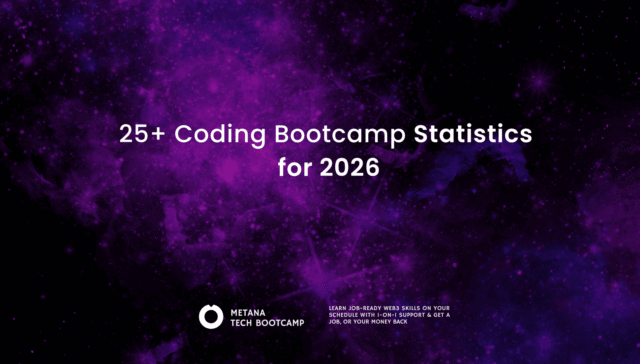TL;DR
- AI / Machine Learning Engineer
- Cybersecurity Analyst
- Cloud Engineer
- DevOps Engineer
- Data Analyst
- Full-Stack Developer
- Information Security Architect
- Product Manager (Technical)
- Solutions Architect
- Database Administrator
- AI Prompt Engineer
- UX Designer (Technical)
- Enterprise Architect
The 13 Most In-Demand Tech Jobs in 2026
1. AI/Machine Learning Engineer
Salary: $80K-$130K+ | Growth: 18–34%
AI engineers build the systems that power everything from recommendation engines to autonomous vehicles. This role requires serious technical skills in Python, TensorFlow, and deep learning frameworks. The good news? You don’t need a PhD. Many successful AI engineers come from bootcamp backgrounds or switched from related fields like data science.
Why choose this: You’re working on technology that literally shapes the future. AI projects feel cutting-edge and intellectually stimulating. The salaries are among the highest in tech, and remote work is standard. If you love continuous learning and want to solve problems nobody’s solved before, this is your lane.
2. Cybersecurity Analyst
Salary: $55K-$90K | Growth: 33%
Every data breach makes headlines, and every company panics. Cybersecurity analysts are the answer. You’re protecting systems, finding vulnerabilities, and staying ahead of threats. The work feels high-stakes and purposeful.
Entry into this field is realistic for career switchers. Security+ certification or similar credentials can open doors within 6-9 months of study.
3. Cloud Engineer
Salary: $70K-$105K | Growth: 11%
Cloud infrastructure powers modern tech. Cloud engineers design, build, and maintain systems on AWS, Azure, or Google Cloud. Companies migrating to cloud need people who know how to get it done right.
The skills are learnable. Start with cloud certifications, and experience builds quickly on the job.
4. DevOps Engineer
Salary: $70K-$100K | Growth: 21%
DevOps engineers automate and streamline how software moves from development to production. If you love efficiency and solving operational puzzles, this role delivers daily satisfaction. The automation focus means you’re building things that last.
This role suits people who want technical work without deep coding requirements.
5. Data Analyst
Salary: $45K-$70K | Growth: 23–34%
Data analysts translate raw data into business insights. You’re part detective, part strategist. The work influences company decisions, which makes it feel impactful. Excel, SQL, and visualization tools are your toolkit and no coding degree necessary.
Perfect entry point for non-technical career switchers. Many land roles with a bootcamp certificate.
6. Full-Stack Developer
Salary: $95K+ | Growth: 17%
Full-stack developers build entire applications from user interfaces to backend systems. You need broader skills than specialists, but the versatility makes you valuable everywhere.
Portfolio-driven hiring means bootcamp graduates compete equally with degree holders. Three solid projects beat a resume every time.
7. Information Security Architect
Salary: $110K-$140K | Growth: 33%
Information security architects design security systems from the ground up. This role sits between technical and strategic and you’re making big-picture decisions about how organizations protect themselves.
This is mid-to-senior level. You’ll need foundational security experience first, but the payoff is significant.
8. Product Manager (Technical)
Salary: $65K-$110K | Growth: 17%
Technical product managers guide product development from concept to launch. You’re working across teams, solving problems, and directly impacting what gets built. It’s leadership without always managing people.
Career switchers from other fields often thrive here. Your previous industry expertise becomes an asset.
9. Solutions Architect
Salary: $85K-$120K | Growth: 10–15%
Solutions architects design tech systems that solve specific business problems. It’s part consultant, part engineer. You need both technical depth and communication skills.
Experience matters here more than credentials, making it ideal for people with proven track records in other tech roles.
10. Database Administrator
Salary: $105K+ | Growth: 8%
Every company needs someone protecting and organizing their data. Database administrators ensure systems run smoothly and securely. It’s behind-the-scenes work that companies can’t function without.
Stable, decent-paying roles with less competition than flashier positions. Good option if you want solid job security.
11. AI Prompt Engineer
Salary: $65K-$100K+ | Growth: $65K–$100K+
This is the newest role on the list. Prompt engineers fine-tune how AI tools respond. It sits at the intersection of language, logic, and creativity. You’re experimenting with cutting-edge technology.
Entry barrier is surprisingly low. Portfolio of prompts and results can get you noticed. No traditional background required.
12. UX Designer (Technical)
Salary: $55K-$85K | Growth: 10%
Technical UX designers bridge design and development. You’re solving real usability problems using data and psychology. The work is visual and immediately rewarding.
Design bootcamps work well here. Strong portfolio matters more than degree. If you’re detail-oriented and empathetic to user needs, this fits.
13. Enterprise Architect
Salary: $170K–$199K | Growth: 4%
Enterprise architects design entire IT infrastructure for large organizations. It’s the most senior role on this list. You’re making strategic decisions that affect thousands of people.
You’ll need substantial experience before landing this role, but the compensation justifies the climb.
Which Tech Jobs Are Best for Career Switchers?
If you’re coming from outside tech, focus on these roles first:
Easiest entry: Data analyst, UX designer, cybersecurity analyst, prompt engineer. These roles have lower technical barriers and often prioritize problem-solving skills over specific experience.
Realistic with bootcamp: Full-stack developer, front-end developer, DevOps engineer. Bootcamps give you concentrated skills and portfolio projects that matter to hiring managers.
After proving yourself: Cloud engineer, solutions architect, product manager. Land a first tech role, build credibility, then move into these more specialized positions.
Key Takeaway: The Tech Job Market Favors Skills Over Credentials
The biggest shift in tech hiring? Degrees matter less than they used to. Companies hiring for 2026 care about what you can actually do. A strong portfolio, relevant certifications, and real project experience often beat a computer science degree.
If you’re thinking about a career switch to tech, the gap between intention and action is smaller than you think. Pick a role that aligns with your strengths, commit 6-12 months to skill-building, and you’ll be competitive.
The tech industry needs people. It needs them now. And it’s hiring.
Frequently Asked Questions About Tech Jobs For 2026

Q: Do I really need a computer science degree to get into tech?
No, but it depends on the role. Security analyst, data analyst, and prompt engineer don’t require one. Backend and frontend engineering are doable with bootcamp + portfolio. The degree matters less than demonstrating you can actually do the work. That said, at larger companies (Google, Meta, finance), degrees can still be a filter. At startups and mid-size companies? Portfolio and experience beat degrees every time. Your first job might require a degree. Your second and third? Nobody cares.
Q: Should I do a bootcamp or self-teach?
Bootcamp if: You need structure, accountability, and a guaranteed timeline. You want direct mentorship. You’re switching from non-tech and need credibility signals fast. Cost is $15K-$20K but saves you 6-12 months of confusion.
Self-teach if: You’re disciplined, can handle ambiguity, and don’t mind a slower job search. You already have some technical foundation. You’re willing to spend 12-18 months versus 3-4 months. You save money but lose the network and brand name.
Honest take: Bootcamp + self-teaching after is the real path. Learn basics in bootcamp, build projects on your own, learn depth independently.
Q: What’s the salary reality for my first tech job?
Your first tech job will pay $50K-$70K depending on location and role. This is non-negotiable. You don’t have leverage. After year 2, you jump to $75K-$90K. After year 3-4, you hit $100K+. Negotiation only matters once you’re not desperate. Focus on learning, not optimizing first-job salary. The growth compounds.
Remote work salaries are lower than in-office—expect 10-20% haircut if you negotiate remote for your first role.
Q: How fast can I actually break into tech from a non-tech background?
Realistically: 6-12 months of serious skill-building, then 3-6 months of job hunting. So 9-18 months total before you land something. Cybersecurity analyst is fastest (6-9 months with Security+ cert). Data analyst or prompt engineer next (6-12 months). Backend/frontend engineer takes longer (9-18 months) because competition is fiercer.
The people who break in in 3 months? They either had some technical background already or got incredibly lucky. Plan for 12-18 months and you’ll be pleasantly surprised if it’s faster.
Q: Should I specialize early or stay generalist?
Specialize. By year 2, companies expect you to be really good at one thing. The generalist path makes sense after you have specialization—senior engineer → architect is specialization evolving into strategy. But junior generalist? You’re competing against people who are deep in one area. You lose every time.
Pick a direction by month 6 of your first role. By year 2, be the person people call for that specific thing. That’s how you become valuable.
Resources Considered
- BLS Occupational Outlook Handbook (U.S. Bureau of Labor Statistics – official growth and salary projections)
- Glassdoor Salary Data (real-time user-reported salaries, U.S. and global)
- Indeed Salary Search (crowdsourced salary insights, updated daily)
- Robert Half 2025 Salary Guide (downloadable PDF with tech role percentiles)
- LinkedIn Jobs on the Rise 2026 (annual report on fastest-growing roles)







